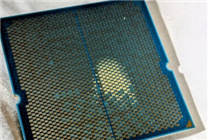Mystery Over Ryzen 9 9950X CPUs: Two Processors Burned During GMP Tests
Recently, a concerning incident involving AMD’s flagship Ryzen 9 9950X processors has emerged, with two units reportedly burned while running GMP tests. This unexpected failure has caught the attention of the tech community, raising questions about possible causes and implications for enthusiasts and professionals alike.
Background of the Incidents
The two catastrophic failures occurred in a controlled testing environment using motherboards equipped with the Asus B650 chipset. Both tests were executed under standard conditions, featuring adequate cooling measures—including an additional fan—but still led to the burning of the CPUs.
The first incident was logged in February using the Asus Prime B650M-K motherboard with BIOS version 3057, while the second incident transpired just days ago with the Asus Prime B650M-A WiFi motherboard, utilizing BIOS version 3278. While both motherboards are budget models, they are typically deemed capable of supporting high-end processors unless subjected to extreme overclocking, which was not the case here.
Testing Conditions
The configuration for both tests was nearly identical, with only power and memory settings changed. Notably, the CPU coolers utilized were Noctua NH-U9S models. While this cooler may not be optimal for a high-performance processor like the 9950X, which can draw up to 170W under full load, it should suffice under normal use.
In both scenarios, ambient temperatures were maintained below 20°C for the first test and slightly above for the second. Importantly, there was no overclocking or overpressure applied during either run, which adds to the mystery of the failures.
Comparing with Other Models
Interestingly, a Ryzen 9 7950X with a similar setup has been reported to operate smoothly, even under higher loads for extended periods, without any signs of failure. This raises the question: why did the Ryzen 9 9950X fail?
Theories on the Causes
The GMP Project has put forward hypotheses regarding the incidents. One theory suggests that the Ryzen 9 9950X may be consuming more power than initially expected during GMP tests, although this remains speculative at best. Additionally, during the second test, there were concerns that the heatsink might have been misaligned while attempting to improve cooling on the CPU’s hotspot. Such an offset could potentially create gaps between the CPU and the heatsink, leading to overheating and subsequent failure. However, the first test displayed similar issues despite having the heatsink properly centered.
Gradual Degradation Observed
Another critical aspect to note is that neither of the 9950X CPUs experienced immediate failures; both succumbed after prolonged high-load operation lasting several months. This could indicate a gradual degradation process, signifying that the failure is not simply a random event but could be predictable.
Conclusion
The situation surrounding the AMD Ryzen 9 9950X processors serves as a stark reminder of the unpredictable nature of computing hardware. While the specifics behind the burning of these two CPUs remain unclear, it highlights the importance of continued monitoring and the need for rigorous testing protocols in high-performance computing environments.
For enthusiasts and professionals using the Ryzen 9 9950X, it may be prudent to pay close attention to thermal management and power consumption to avert potential issues. As investigations proceed, we keenly await further developments and insights into this mysterious case.









